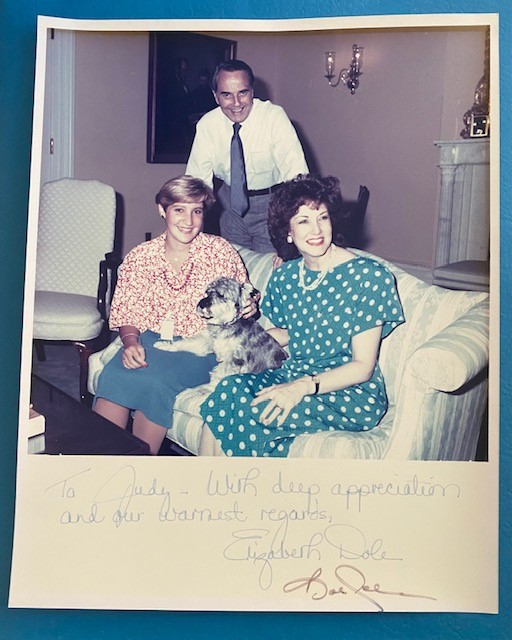Senator Dole’s work helping people with disabilities is legendary, but here’s a story you may not know.
In 1988, after Senator Dole lost the New Hampshire Primary, he invited the campaign staff to the U.S. Capitol to thank them for their good work.
“On Wisconsin!” he would say, as he rallied the crowd for the upcoming primary.
Then he took a minute to greet us and say ‘thanks’.
Bob Dole: “I remember you. You’ve been here forever.”
Me: “Almost since the first day, sir.”
Bob Dole: “Well keep up the good work.”
Wisconsin wasn’t to be, and Dole’s presidential ambitions were cut short.
I wasn’t sure what I would do next. I needed time to refresh and find my purpose.
My boss, Bill Lacy, was moving to California to run the Bush-Quayle ’92 campaign – the last Republican campaign to win in California. He asked if I might be interested in joining him.
I needed to clear my head and I do that by going to the beach. I went running at Virginia Beach with no shoes. I ran for miles, trying to find my purpose. I ended up with chondromalacia, swollen tissue under my kneecaps, knee braces & crutches. This would last about a year, with rehabilitation.
About that time, I got a call from Jo-Anne Coe. She was Senator Dole’s top political advisor and needed an assistant in the U.S. Capitol Office. I went to interview with her – crutches, knee braces, and all. She worked in one of the U.S. Capitol “hideaway” offices on the 3rd floor.
After we spoke, she brought me down to visit with Senator Dole. He wanted to see if I’d be a good fit for the position, handling appointments to boards and commissions, political correspondence, and meeting with constituents interested in working somewhere in Washington. Somehow, I was convincing enough to get the job.
One day, an opening came up on one of the most significant bodies – the U.S. Commission on Civil Rights. This was a popular commission for people of color, constituted after the U.S. Civil Rights Act in 1964. We got hundreds of letters of recommendation from leaders around the country in the Asian, Indian, Hispanic and Black communities – all of whom wanted this appointment on the commission.
I was only 29 at the time. This was largest outpouring of interest I’d seen for any board or commission. No matter who Senator Dole appointed, other groups would be left out, thus the political significance and pressure on me to make the very best recommendation.
I checked in with my colleagues at the White House since President Bush (41) also had an appointment up around the same time. It was in both of our best interests to coordinate to make sure we were balancing our appointees for the good of the country.
Senator Dole had been very active in his Dole Foundation which helped to promote employment of people with disabilities. So, I did some research to see if anyone appointed to the U.S. Civil Rights Commission had ever been a person with a disability.
Me: “Senator, we have an opportunity here. There has never been anyone appointed to the U.S. Civil Rights Commission who has a disability. You could change the focus of the commission from one of color to one of acceptance of people with disabilities.”
Dole: “Let me think about that. What’s our deadline? Can I let you know tomorrow?”
He asked me to visit with his Chief of Staff, Sheila Burke, and run the idea by her.
Forty minutes later, he walked into the staff office and said he was ready and to start researching good candidates.
Working with my Senate colleagues, we cast a net to several disability advocacy groups to find some good candidates. The lobbying campaign started again. I started doing my research on a short list of viable contenders.
I received quite a bit of lobbying for a well-known GOP disability right activist, even getting a call from then-RNC Chairman Lee Atwater. There was also a brilliant scholar from New York who was appealing. Both had significant political support.
But Senator Dole had other thoughts. He wanted to appoint someone who became disabled but lifted his or herself up to become successful in business. He was less interested in a professional disability advocate, favoring someone who would be committed to his mission of breaking down barriers between employers and those physically challenged.
His fellow Senator Jake Garn (R-UT) told Senator Dole about his nephew – a brilliant economist from the Wharton School of Business. He became injured when a toy rocket blew up in his hands as a child, losing several fingers and blinding him. I arranged for a phone call with Senator Dole and Russell Redenbaugh.
Several weeks later, we began preparations to announce Mr. Rendenbaugh’s appointment. I worked with Dennis Shea on a floor speech that the Senator would deliver from the Senate Floor. We would do a press conference outside the Senate Gallery.
Mr. Redenbaugh entered the Capitol office with his wife, met with me and Dennis and we outlined how the day would go. Soon, Dennis was summoned to accompany Senator Dole on the Senate Floor. I was left in the front office, which had audio of the Senate Floor but no video.
As I listened to the speech, all I could think of was how much I wanted to watch it. But there I was – listening to it – not viewing it. Just as Mr. Redenbaugh was.
My favorite part of the speech – “Just because you’re disabled, doesn’t mean you’re not able.”
— Senator Bob Dole
During the press conference, we listened to Senators Dole and Garn and Russell Redenbaugh. I remember holding my leather U.S. Senate portfolio up to my face, leaning my head down because I teared up when I heard their stories.
That moment might have been more important to my understanding of Bob Dole than any other. That day, he changed not one life – but thousands – giving a voice to people with disabilities on the U.S. Civil Rights Commission.
In 2000, Mr. Redenbaugh would author the minority opinion for the U.S. Civil Rights Commission regarding voting rights and access in the Bush v. Gore case in Florida. Today, he is one of two blind jujitsu champions whose passion is finding an end to poverty in the United States. He is also raising money to become the first blind astronaut, following in the footsteps of his Uncle Jake Garn, the first public official in space.
Excellence is measured in many ways, but for Bob Dole and Russell Redenbaugh, it was determined by taking chances, not being afraid to fail, and having the will to do and be something greater than yourself.

